That's the newspaper industry's business model - even the paper you are reading right now. Charge for the printed paper; give free access to the Web version. Is it any surprise that newspapers are in terrible trouble? The New York Times and the Washington Post both lost money in the most recent quarter. Last week, the Tribune Co., publisher of 12 newspapers, filed for bankruptcy protection.
Among the first things to go as the industry cuts back has been foreign correspondents. Only a handful of newspapers still staff foreign bureaus - at a time when world news holds extraordinary importance, especially during a worldwide recession.
Today, only the New York Times employs a full complement of correspondents around the world - and provides adequate space in the newspaper to print their work. As much as I respect the Times, my employer for almost 25 years, should we rely primarily on one newspaper, with its own quirks and unique points of view, to provide this coverage?
Newspaper publishers are certainly not complacent about the industry's paradoxical business model. But no one seems to know how to fix it. I have an idea. But first, the context.
In about 1995, as newspapers discovered the Internet, they began putting up Web sites - as an experiment. Publishers then generally believed that people interested in technology would read a newspaper online. That view held for years. In 1999 and 2000, I was covering the Microsoft antitrust trial in Washington - the biggest technology story of the day. The Times asked me to come back to the office at midday to file a story for the Web site. Reporters covering the White House, Congress and the rest weren't filing just for the Web. Those weren't technology stories.
In 2003 and 2004, publishers began to realize that the Web was taking over the business. In fact, readers and advertisers were abandoning the printed newspaper and reading it online - for free. In the years since, this trend has worsened. Industry experts say they expect several newspapers to go out of business next year.
The newspapers' biggest problem is their inability to make much money from their Web sites. Web advertising generally pays 10 cents for every $1 earned from print ads. And, of course, there is no circulation income.
When the sites were regarded as technology curiosities, there was no thought of charging people to use them. By the time papers realized that they should be charging, it was too late. No one wanted to be the first paper to charge, given that nearly all of the other papers, and other online news sources worldwide, were free. Several papers tried charging, but most backed off.
Now, here's my idea: The newspaper industry should ask the Justice Department for an antitrust exemption that would allow publishers to collaborate on a decision to begin charging for their Web sites. No paper would have to charge, and each paper could determine its own price. But if most papers in a region - San Francisco, Oakland and San Jose, for example - began charging for Web access at more or less the same time, many readers would likely subscribe.
"It's an intriguing idea," John Sturm, president of the Newspaper Association of America, told me. "I do not recall hearing that notion before."
Certainly, as Sturm noted, readers could find some of what the newspaper offers elsewhere. Sports scores at espn.com. Political news at politico.com. But then, the onus on each paper would be the same one that has prevailed since the first newspapers were published in Germany 500 years ago: to provide unique, exclusive content that readers crave and cannot get anywhere else.
Still, as Sturm put it, "it's not an easy putt, by any means." Perhaps. To gain an antitrust exemption, an industry most prove that the decision would serve the public interest. But a healthy newspaper industry could not be more central to the public interest. A democracy cannot function without an assertive news media. And there's a precedent.
Over the years, the Justice Department has issued numerous antitrust exemptions allowing two newspapers in a community to combine their business operations so both newsrooms could survive. Newspaper competition, the department found, is in the public's interest.
Now, more than ever.
source : http://www.sfgate.com/cgi-bin/article.cgi?f=/c/a/2008/12/20/IN6C14PEOM.DTL
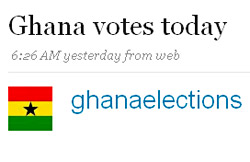 The Mobile Active blog [2]
The Mobile Active blog [2] 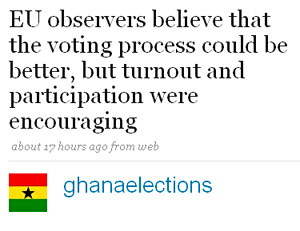 One of the Twitter users that twittered the vote and the subsequent results almost minute by minute was [3]
One of the Twitter users that twittered the vote and the subsequent results almost minute by minute was [3]  Other twitterers had more modest intentions and simply wanted to [4]
Other twitterers had more modest intentions and simply wanted to [4] 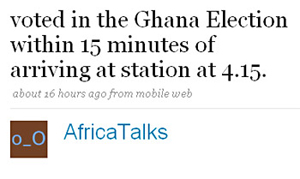 [8]
[8] 
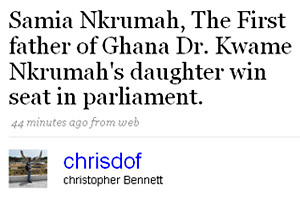 For example, chrisdof announced that the winning of a seat in Parliament by the daughter of [16]
For example, chrisdof announced that the winning of a seat in Parliament by the daughter of [16] 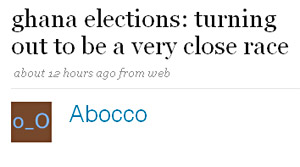 As of Monday morning the results of the Presidential elections are not yet clear, only that it was a [19]
As of Monday morning the results of the Presidential elections are not yet clear, only that it was a [19]  To address some of these challenges, the I
To address some of these challenges, the I